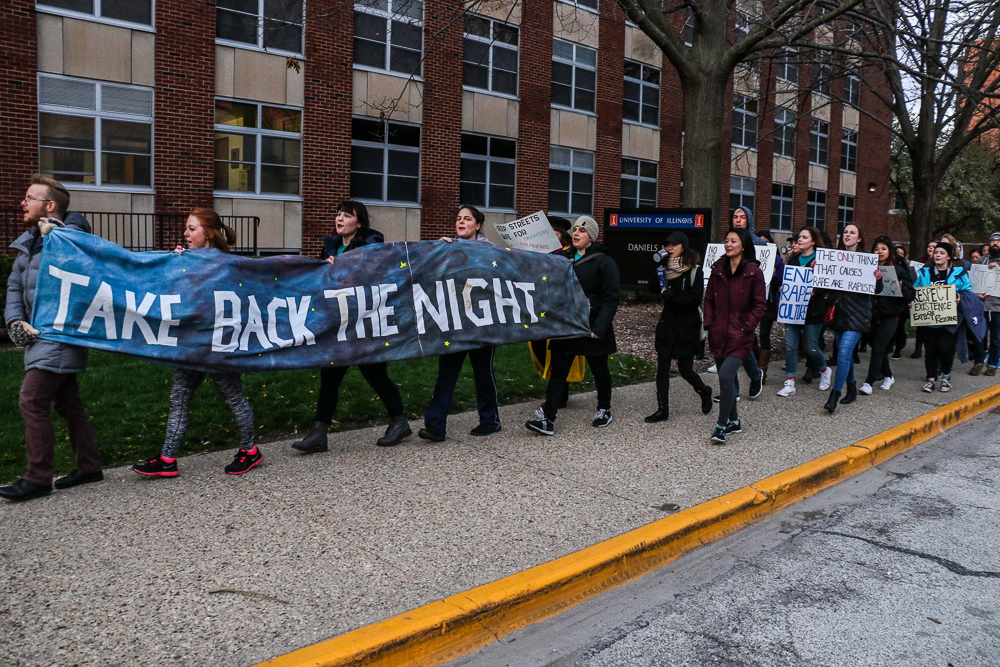Students Against Sexual Assault advocates for awareness
Demonstrators take part in Take Back the Night, an event aimed at raising awareness around sexual violence, on April 6th, 2017. The event was part of Sexual Assault Awareness month, of which Students Against Sexual Assault was a co-sponsor.
Sep 6, 2017
Sexual assault is, unfortunately, a very prevalent issue across college campuses. While the University has rules and regulations in place to support survivors of sexual assault, a group of students also do their part to educate and help protect against sexual assault.
Students Against Sexual Assault (SASA), a University RSO, was created in Fall 2015 and has been active for change ever since.
The club had their first meeting of the year on Tuesday, in the Women’s Resource Center (WRC), which recently moved locations.
SASA often works with the WRC to hold events to support survivors of sexual assault and raise awareness about sexual assault on campus.
Rachel Christie, senior in LAS, is starting her second year as president of the organization.
Get The Daily Illini in your inbox!
Christie wrote in an email that the organization strives to support survivors on campus and educate the community on how to support survivors.
“SASA is an RSO that aims to eliminate sexual assault and other forms of gendered violence,” Christie wrote. “We want survivors on our campus to feel safe sharing their stories, and we create many spaces and events throughout the year dedicated to this. SASA is a completely survivor-centered organization.”
One of the main events SASA puts on is “It Happens Here.”
It is a biannual event that occurs in April, when the topic is sexual assault for “Sexual Awareness Month,” and in October, when the topic is domestic violence for “Domestic Violence Awareness Month.”
The event was originally put on by students at Middlebury College and has since spread to universities across the nation. The first event at the University in 2015 was the largest in”It Happens Here” history.
Christie wrote the goal of the event is to raise awareness about assault and abuse, specifically on campus, by allowing survivors to come forward anonymously. During the event, survivors anonymously submit their stories of sexual and gendered violence on online. The stories are then read aloud on stage.
“We seek to empower survivors by giving their voice a platform in a way that doesn’t jeopardize their emotional or physical safety by allowing them to remain anonymous yet still be heard,” Christie wrote. “‘It Happens Here’ shows the prevalence and human impact of sexual assault and gendered violence. This is something that affects people on our campus and in our community.”
Another event SASA hosts is called “SASA Speaks,” which is dedicated to taking a stand against all forms of gendered violence. It is an annual mic night usually held in the Courtyard Cafe.
Molly McLay is an assistant director at the WRC and the sponsor of SASA. She said the event allows people to express themselves in creative ways.
“It’s an opportunity for people to share creative work,” she said. “There’s sometimes featured performers. There’s a Women’s Resource Center affiliated band called ‘Love Handles’ that performs at that; we have poets that are affiliated with the center and organization perform. It’s more of an open mic night event.”
Christie also wrote the event is for people to come forward and be heard in any creative way they choose.
“We provide a platform for survivors and supporters to express themselves any way they see fit, such as dance, music, skit, speech or poem,” Christie wrote.
What seems to make these events so successful is students are the main organizers, hosts and participants.
McLay said student activism can be powerful on a college campus, and that SASA t has been a successful organization because of its student-led projects and events.
“Student activism has been a major component to end rape and dating abuse for a long time,” McLay said. “There was a long time where there wasn’t any organization dealing with this issue on our campus.”
McLay also said while programs like FYCARE are helpful, the academic setting can be a bit tiring for students, so organizations like SASA are refreshing.
“Students are looking for other ways to work on this issue, so I think to have this avenue is very important to our campus,” she said. “When students are centered in decisions that involve them it’s very important. When they have decision-making powers and are able to have a collective voice to make a decision on campus it’s very powerful, especially when survivors are able to have that voice.”
Suda Rao, junior in LAS and publicity chair for the club, wrote in an email she joined the organization because of the supportive student community it had.
“When I first came to campus, I started volunteering with the center, and I heard about SASA because it meets in the WRC,” Rao wrote. “I then became friends with some of the members and I decided to join because I had found a supportive community within the club, just as I had found in the WRC.”
Rao said she believes activist clubs like SASA are a central component to make real change and help solve problems on campus.
“Clubs that are based in activism like SASA are important because they call for change on campus,” Rao wrote. “These types of organizations highlight the issues that our university faces to raise enough awareness. If enough people know, then hopefully more people will demand change and these problems can be solved.”






